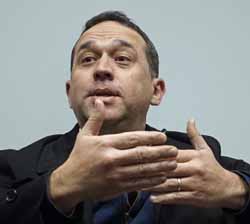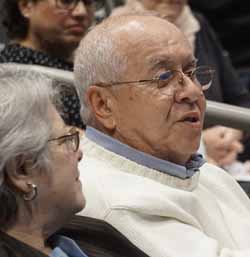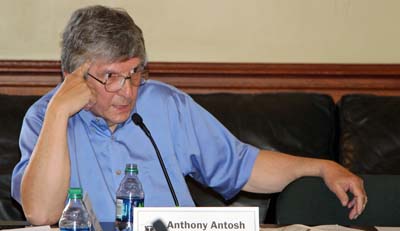Public Slams RI DD Funding Constraints
/By Gina Macris
Funding for Rhode Islanders with developmental disabilities works against the individualized care that is at the core of the state’s vision for social services.
That was the assessment from families and developmental disability professionals who responded to an outside consultant’s call for public comment Nov. 5 about the rates and rate structure governing Rhode Island’s privately-run system of care.
Rick Jacobsen * All Photos By Anne Peters
Rick Jacobsen, a representative of the New England States Consortium Systems Organization (NESCSO), hosted an open-ended conversation with an audience of about 40 people during a public forum at the Barrington Public Library sponsored by the Rhode Island Department of Behavioral Healthcare, Developmental Disabilities and Hospitals (BHDDH).
There is wide concern among families that “in many cases the funding doesn’t seem to be reflecting the support needs” of the individuals in question, said Claire Rosenbaum, who has a daughter with developmental disabilities and also works as Coordinator of Adult Services at the Sherlock Center on Disabilities at Rhode Island College.
Claire Rosenbaum
Rosenbaum said Individuals with varying needs seem to be assigned the same middle-of-the-road funding, according to what she has heard anecdotally in her position at the Sherlock Center.
Much of the discussion focused on the fee-for-service reimbursement system called Project Sustainability that the state implemented in 2011. The state uses a highly scripted interview process, called the Supports Intensity Scale (SIS) to determine the support needs of each adult approved for developmental disability services. Then a closely held algorithm is applied to the SIS score to come up with one of five funding levels for each person.
The core issue is “how you get from the (assessment) score to the level of funding,” said Cliff Cabral, vice president of Seven Hills Rhode Island, a service provider. That process is a “complete mystery,” he said.
Cliff Cabral
He pointed out that the developer of the assessment, the American Association on Intellectual and Developmental Disabilities, did not intend it to be used as a funding tool.
And Cabral noted that the U.S. Department of Justice (DOJ) has criticized the seeming conflict in having the same state agency both performing the SIS assessment and controlling funding for individuals’ services.
“The need to keep consumers’ resource allocations within budget may influence staff to administer the SIS in a way that reaches the pre-determined budgetary result,” the DOJ said in findings that led to a 2014 consent decree with the state to reform disabilities services.
BHDDH is having a series of community conversations about outsourcing individual service planning and case management functions to a third party to comply with federal conflict-of-interest rules, but some who have attended these sessions say they understand that the parameters of the discussion do not include an outside entity taking on the SIS assessment.
Asked for comment after the forum, BHDDH has issued a statement which said that the discussion around the third-party Health Home “has included an expressed interest in a fire wall between assessment and funding. In these discussions, which are informing the case management redesign, BHDDH has agreed to consider future assessment responsibility.”
If the assessment were put in the hands of a third-party, it would relieve the tension, said Mary Beth Cournoyer, who has a son with developmental disabilities.
In Novemeber, 2016, the SIS was updated and the interviewers were retrained. But at the Barrington forum, Claire Rosenbaum said the re-cast “SIS-A” is not very different than the old one. And parents, including Dorie Carder, whose 20 year-old son has developmental disabilities and a medical condition, reported that interviewers are still argumentative, challenging their perceptions of their children and trying to pull the answers to the questions in one direction or another.
Another problem cited at the forum involved appeals by familes and providers who disagree with the funding resulting from the SIS. Rosenbaum said the appeals require a “ton of staff time.” And she said they must be filed annually or every three months, depending on the situation.
Sue Joinson
Sue Joinson agreed, pointing out that the appeals also cost BHDDH social workers extensive time. Joinson, whose daughter has extensive medical needs, also has worked on appeals in her job as director of nursing at the Corliss Institute, a developmental disabilities service provider.
Dorie Carder, the parent with the 20-year-old son, said the first SIS she had was a “horrible experience.”
Dorie Carder
When she appealed the results, she faced off alone against a BHDDH lawyer and a social work supervisor, who challenged her on the medical details of her son’s case. Then, Carder said, she had to wait a year to get the results of the appeal. Still dissatisfied, she went to the Director of Developmental Disabilities, Kerri Zanchi, who ordered a new SIS interview that resulted in a better funding level.
Before the SIS was adopted in 2011, the state accepted a questionnaire called a personal capacity index, combined with a “situational assessment” of the individual in various settings, to come up with an overall evaluation of need, said Joanne Malise, executive director of Living Innovations, which specializes in supporting adults with developmental disabilities in shared living arrangements in private homes.
Connie and John Susa
At one point, John Susa, a parent and long-time advocate, turned the tables on Jacobsen, the consultant, and asked Jacobsen if he thought Rhode Island has a system where “the money follows the person”, meaning that funding is tailored to meet individual needs.
Jacobsen replied, “There are a lot of constraints that intervene with that” personalized funding.
The audience provided examples of the constraints:
Agencies must bill for services in 15-minute increments for each person during the day and cannot bill for time if a client is absent for any reason, even though the agency must maintain the same level of staffing
Transportation funding is limited to one round trip daily, not conducive to community integration
Staffing for community-based activities is linked to specific ratios that depend on individuals’ funding levels, not to the desired destination of any one person.
For families who direct a loved one’s individual program, money is forfeited if it is not used within the three-month period for which it is allocated, for whatever reason, including staff shortages or hospitalizations.
Joinson recounted how, on the one hand, her medically-fragile daughter’s social service allocation was unused while she was hospitalized, and on the other hand, her social worker pushed back against her attempts to get a residential placement for her daughter, saying that there wasn’t enough money and others had more pressing needs.
“He tried to make me feel guilty,” Joinson said of the social worker, but a residential placement is what her daughter wants. BHDDH is trying to limit high-cost group home placements and instead wants to increase the number of shared living arrangements in private homes, lower-cost options which families and providers alike say often do not work for those with extensive needs.
Meanwhile, Cabral, of Seven Hills, noted that most adults with developmental disabilities do not have families to advocate for them, leaving the agency to act as the family.
The agency cannot turn down the individuals the state refers for residential placement, but these referrals often need a high level of behavioral support that make them a bad fit with those already living in the agency’s group homes, Cabral said.
NESCSO’s consultants have spent months reaching out to service providers and Jacobsen said they still plan to do some site visits.
But Cournoyer urged Jacobsen and other NESCSO representatives do a “deeper dive” into specifics from the family perspective.
Jacobsen was asked what impact NESCSO’s recommendations would have on the system. He said NESCSO was hired to give BHDDH a range of options, from small changes to blowing up the entire system and putting a new one in place. But in the end, the “choice is not mine,” he said. Instead, BHDDH officials have reserved the right to decide which options to pursue - or not.
Whether NESCSO’s recommendations ultimately result in real improvements will depend on the advocacy of the community, he said.
Jacobsen said he spent 20 years working for Medicaid in Rhode Island and no one ever asked him “how to spend more money.” Quite the opposite, he said.
If BHDDH asks for more money, Jacobsen said, someone “beats them over the head.”
BHDDH was not represented during the discussion, which was recorded and posted on the Facebook page of RI FORCE, a family advocacy group. Asked to comment on the recording, the department provided this context:
“BHDDH has invested sizable resources into a rate review process to provide the needed analytics and options to support system transformation. The department is committed to quality, safety and access through its vision of individualized, person centered, self-determined and community-based supports.
We recognize that this vision requires system transformation. While the system has certainly made progress, the underlying reimbursement system remains grounded in past practices. The purpose of this rate review is to assess the costs of services and explore other models for reimbursement. This work must also extend to understanding the system as a whole for consideration of both structural efficiencies and complexities that could hinder or promote transformation. This work is in progress and this is why feedback and input from the community remains vital and welcomed.
While the department has demonstrated its responsiveness through modifications and investments within the current structure, we look forward to the completed analytics and options that NESCSO will deliver to support both near term and long-term changes.”


















